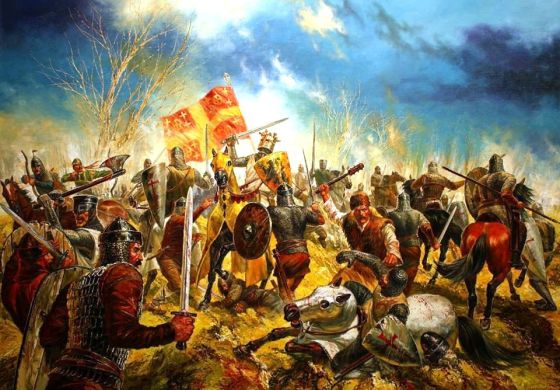Difference between revisions of "Adrianople, battle of (378)"
Tao alexis (talk | contribs) (Created page with "right|560px|thumb| The '''Battle of Adrianople''' was a severe defeat suffered by the Romans at the hands of the Visigoths. Somewhat earlier,...") |
Tao alexis (talk | contribs) |
||
| (One intermediate revision by the same user not shown) | |||
| Line 5: | Line 5: | ||
To deal with the serious crisis precipitated by the defeat, the Romans were forced to call Theodosius out of retirement and make him emperor. This energetic ruler restored order, punished the Visigoths and saved Constantinople from destruction. Still, the battle is often considered the start of events leading to the fall of the Western Roman Empire in the 5th century. | To deal with the serious crisis precipitated by the defeat, the Romans were forced to call Theodosius out of retirement and make him emperor. This energetic ruler restored order, punished the Visigoths and saved Constantinople from destruction. Still, the battle is often considered the start of events leading to the fall of the Western Roman Empire in the 5th century. | ||
| + | |||
| + | [[Category: Places in Asia Minor]][[Category: Land Battles]] | ||
Latest revision as of 21:51, 13 May 2023
The Battle of Adrianople was a severe defeat suffered by the Romans at the hands of the Visigoths. Somewhat earlier, the Visigoths had been driven across the Danube by the Huns. They'd been allowed to settle in Roman territory, in order that they might constitute a frontier force to oppose possible Hunnish invasions of the Empire.
However, the Visigoths were abused so severely by Roman officials that they rebelled and marched on Constantinople. At Adrianople, the Emperor Valens attempted to oppose their advance, but his army was overwhelmed and he himself was killed.
To deal with the serious crisis precipitated by the defeat, the Romans were forced to call Theodosius out of retirement and make him emperor. This energetic ruler restored order, punished the Visigoths and saved Constantinople from destruction. Still, the battle is often considered the start of events leading to the fall of the Western Roman Empire in the 5th century.
